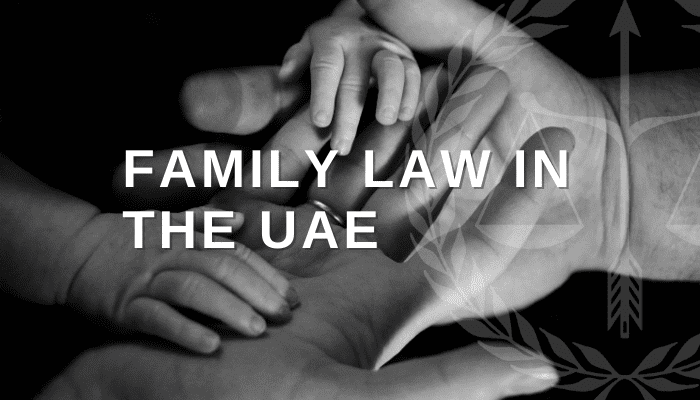Dubai Family Lawyers | Sharia Law For Family | Marriage | Divorce

Family Law In The United Arab Emirates
Family Law in UAE is governed by Shariah Law which basically covers everything from marriage, divorce to succession. The commentary of these personal laws is based on the Imam Maliki school of thought. The relevant laws with respect to family law are Federal Law No 28 of 2005 also known as Personal Status Law, Federal Law No 5 of 1985 known as Civil Transaction Law and Federal Law No 11 of 1992 known as the Civil Procedure Code. The Sharia-based Personal Status Law applies to all including non-Emiratis, unless they choose their own home country’s law (Article 1, Personal Status Law). If a foreign national wishes to apply their country’s law they must provide the laws attested and translated into Arabic for use in the Courts. If a marriage is between two foreigners or between a foreigner or a national it will be valid if it was in accordance with the conditions of each State where it concluded. Law of the State of the husband upon the conclusion of the marriage shall govern personal and financial impacts set up by the contract of marriage. In matters of separation or divorce in the UAE it shall be governed by the law of the State of the husband. If marriage is between a national of the UAE and a foreigner, law of the UAE shall apply except for condition of capacity for marriage.
Is Co habitation legal in UAE?
Before 2021 co habitation was a crime in the UAE and would attract Penal code however after the recent amendment in Federal Decree No 31 of 2021 on the Issuance of Crime and Penalties Law it is not a crime anymore.
How is marriage under Shariah law solemnized?
Under the Federal Law No. 28 of 2005 on Personal Status, marriage is considered to be a legal contract between a man and woman which aims to protect and form a steady family. Under the Shariah Law with respect to marriage there are two contracting parties: the husband and the tutor. The Tutor shall proceed with the marriage after taking the consent from the woman. The majority age for the parties is fixed at eighteen years, however if the spouse’s age is twice the other, the judge’s approval is sought.
Marriage contract needs to be registered in a Sharia court. A premarital screening certificate is needed. Islamic marriages are conducted by UAE Judicial departments and Sharia courts or through the services of authorized marriage officers (Mazoons) in each Emirate.
Contract is invalid in absence of a tutor. The offer and the acceptance must clearly have the word marriage and must be fulfilled immediately and shall not refer to a future time. Due to kinship a person is prohibited to marry his ascendant to highest degree, descendant to the remotest degree, first category of the descendants of one of the grandparents, descendants of the two parents or one of them to the remotest degree.
A marriage contract shall be valid only if there were two male male witnesses present of sound mind and full capacity and must be Muslim.
The husband must offer dowry in money or property for the purpose of marriage. There is no minimum limit fixed for dowry however maximum limit is fixed under Federal Law No. 21 of 1997 on Fixing the Dowry which says that Islamic Dowry may not exceed AED 20,000 and deferred dowry may not exceed 30,000 AED. It is the property of the bride so she can dispose of it. It may be whole or in part. It is by virtue of a valid contract and becomes certain by consummation of marriage.
Rights Of Wife Towards Husband
The wife has the rights of Alimony, non-obstruction to complete education, non-interference with the personal matters, non-infliction of bodily or moral prejudice to her, non-opposition to visit her ascendants, equitable treatment between other wives.
Rights Of Husband Towards His Wife
The husband has a right towards his wife that she must supervise the house. preserve the assets and a right of suckling of his children.
What is Interfaith marriage?
Interfaith marriage is when people of different faiths are united in matrimony. A Muslim man is permitted to marry a non-Muslim woman as long as she is “Ahl-e-Kitab” or “Of the Book” and follows the Abrahamic religion that is Christianity and Judaism. If the woman is not “of the book” she must revert to Islam for marriage. However, a non-Muslim man can’t marry a Muslim woman unless he embraces Islam.
What is Civil Marriage under Abu Dhabi Law?
According to Federal Law No 14 of 2021 on Personal Status for Non-Muslims Foreigners, a family court has been established for non-Muslims in Abu Dhabi. As per the Abu Dhabi Judicial Department, “Civil marriage is the lawful union of a non-Muslim man and woman and it is solemnized as a civil contract without religious ceremony”. This law allows the foreigners, non-Muslims, visitors and nationals of Abu Dhabi to conduct marriage. This Civil marriage no longer requires a religious ceremony or the approval of the guardian. A judge or the Notary approves the marriage and issues a digital certificate. The conditions necessary for this is that no party should be less than eighteen years of age, both the parties shall explicitly give their consent and both shall sign the declaration form.
The documents required for this purpose are:
- Complete and signed marriage form.
- Copy of passport or Emirates I.D.
- If previously married, proof that marriage has been dissolved.
- In case of death of spouse, copy of death certificate.
- If divorced, a copy of divorce certificate.
- If previous marriage was declared null, a copy of the court order.
Usually if the application is approved it takes around five working days to get the certificate and the fees for this application is 500 AED.
For the purpose of divorce, it is sufficient that one spouse declares before the court his willingness for separation and ending the marital relationship without the need to justify this application or demonstrate any damage or to blame the other party. After the divorce, the wife may submit an application to the court requesting alimony from the former husband. The Judge will decide financial support keeping in mind the following: years of marriage, age of wife, the economic status, the extent to which the husband contributes, whether or not to take care of children.
The custody of the children is joint and equal right for both parents upon divorce. If any one of them gives in writing to the court to waive the right to custody, the court will check the circumstances and decide accordingly.
Foreign testator has the right to leave a will to whomever he deems adequate. In case of absence of will, half of the inheritance shall be entitled to husband or wife and the other half shall be equally distributed among the children with no difference between males and females. In case of absence of children, it will go to the parents.
What about marriage of non-Muslims in UAE?
Non-Muslim wedding in UAE is recognized if they occur at places of worship such as churches, Hindu temples, or Sikh Gurdwara. Furthermore, non-Muslim interfaith weddings are typically conducted in the embassy or consulate of the bridegroom or the groom. Personal Status Court of Dubai performs marriages between people who are Muslim by faith.
What is the divorce procedure?
Divorce is the dissolution of marriage contract in a prescribed form. It can be verbal as well as in writing. However, verbal divorce must be proven in court through witnesses or by oath or by a court judgement. In UAE there is no such thing as Judicial Separation, the only separation is by court. The process for divorce starts when one party asserts their decision to part ways. Article 98 of the Personal Status Law says a conciliatory procedure is mandatory in divorce proceeding since the Quran promotes reconciliation through negotiation settlements between spouses. Thus, the Quran treats divorce as something permitted but not laudable. If both the parties agree and a settlement agreement is drafted, divorce is concluded amicably but if parties fail to reach to an agreement before the conciliator, then court proceedings can initiate. Foreign Law can’t be applied if it is contrary to public order, its effects can’t be determined, if the applicant claims to have dual nationality or whose nationality is not known. ( Article 27 and 28 of Civil Procedure Code)
Grounds of divorce
Under Shariah law divorce can be claimed on the grounds of physical and mental issues like impotency, vaginal occlusion, failure to pay dowry promptly, prejudice and dissension, non-maintenance, absence and loss, detention (Jail Term)
Ila`a
Where the husband swears not have sexual intercourse with his wife for a period of four months or more unless he goes back to his oath before such period, in such case divorce is irrevocable.
Zihar
Where the husband compares his wife’s body to that of another woman who is forbidden to marry (example mother or sister)
Article 110 to 135 of Personal Status law talks about divorce. A woman can apply for divorce but she must demonstrate that she has been harmed. Harm in this context would mean husband’s failure to maintain his wife, home and children or if he is violent. The recent amendments gives the court right to reject such application for divorce which means the right of woman to seek divorce has been restricted.
As for a man the position is different. He need not any ground or consent of his wife to divorce but scholars say that there should be a reasonable ground for such a decision.
The court can nullify a marriage contract if it conflicts with the Shariah Law or public policy. It may be nullified in the following cases:
If marriage takes place in absence of wife’s guardian (Art 39 of Personal Status Law) or if a woman is provisionally or permanently prohibited to the man. In such cases if the Court nullifies the marriage contract, the parties return to their previous status. However, if the court so wishes it can correct the nullity at its own discretion.
What are the types of Divorce in Shariah Law?
Under Shariah Law divorce is known as Talaq -e- Hasan as mentioned under Surah Talaq of the Quran and approved by all schools of Muslim law. If a husband pronounces divorce to his wife and takes her back within three months (Iddat period) marriage remains intact. Also, resumption of sexual relations automatically retracts the divorce. If he pronounces divorce to his wife second time he can still revoke the divorce and take her back during the waiting period. However, if the husband pronounces the divorce third time, the divorce becomes final and irrevocable.
Maintenance (Nafaqa)
Before the divorce is finalized a judge orders maintenance on a temporary basis. Usually, the courts order minimal maintenance for wife and children. However, on the request of the wife, the judge can use his discretionary power and order greater amount. Generally the courts award up to 30% of the fathers income. Child support includes food, education, extra-curricular activities, medical expenses. The objective of this child care is to minimize the disruption in the child’s life. A father must support his children and provide a standard of living similar to what he experienced during the marriage.
Who gets the custody of children?
Child Custody under the Islamic Law indicates that parents do not share equal parental responsibility for their children but provides for different role of father and the mother. The mother has a role of a custodian (Hadana) who takes care of the child, responsible for day to day needs as well as physical aspect of the child. The father on the other side has a role of the guardian or the wilaya. Guardians are considered providers of the financial and substantial needs of the child. Incase of termination of marriage, when deciding on custody the concern of the judge is the best interests of the child. This is as per Article 144-145 of the Personal Status Law. Article 155 says that the judge should choose the most suitable custodian for the child. And custody awarded to a woman ends when a male child reaches 11 years of age and female child 13 years of age and goes to the father since he is financially responsible for his children. If a father does not request custody of the child within six months after the child has reached legal age (11 for boy and 13 for girl) he waives his right.
What are the Visitation rights?
According to Article 154 of the Personal Status Law, only parents have visitation rights. However in case a parent is deceased or absent, visitation rights will be given to first line relatives. Also access to the children for the non-custodian parent is guaranteed under the Personal States Law. The mother cannot relocate the child if it causes hardships to the father for visiting the child, hence the visitation rights of the father are protected.
To conclude UAE has emerged as the most tolerant State in the past few years welcoming people of different faiths and nationalities without any bias and gives many options to the expatriates for marriage based on their religion and nationality.
For further questions and in-depth discussion about your legal needs, please feel free to Contact Us at your most convenient time.



